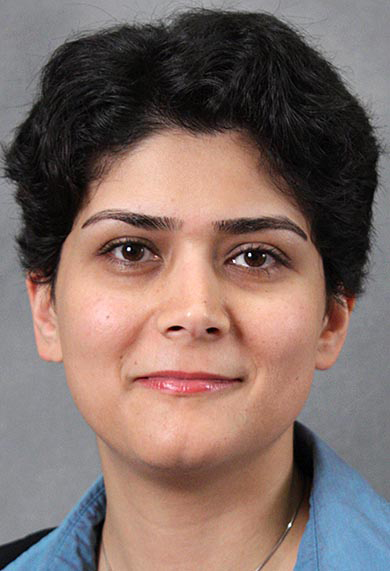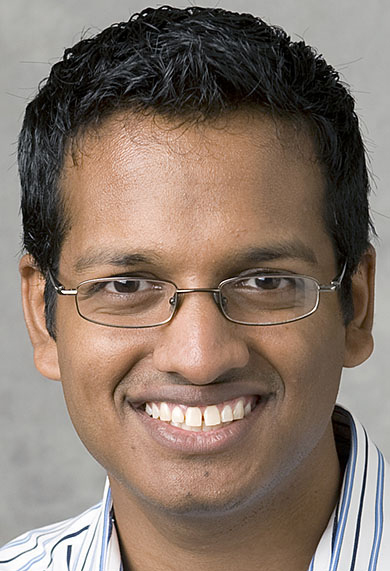2 Purdue researchers receive presidential early career awards
2 Purdue researchers receive presidential early career awards
| Magazine Section: | Breaking News |
|---|---|
| Article Type: | Feature |
Two Purdue University researchers have been named as recipients of a Presidential Early Career Award for Scientists and Engineers (PECASE), the highest honor given by the U.S. government to young researchers.
Selected for the awards were Arezoo Ardekani, an assistant professor in the School of Mechanical Engineering, and Milind Kulkarni, an associate professor in the School of Electrical and Computer Engineering.
They are among 105 recipients who will receive the award from President Barack Obama during a spring ceremony in Washington, D.C. The awards were announced last week by the White House.

(Purdue University photo)
"It is an honor for Purdue Engineering to have two of our faculty members recognized with the PECASE," said Leah Jamieson, Purdue's John A. Edwardson Dean of Engineering. "They join an elite circle of young researchers and educators who are tackling some of the greatest engineering challenges facing the world today. We are enormously proud of Arezoo and Milind."
Among Ardekani's ongoing research is work pointing toward future approaches to fighting bacterial biofilms that foul everything from implantable medical devices to industrial pipes and boat propellers. Biofilms cost the nation billions of dollars annually due to human and animal infections, product contamination and biofouling of membranes.
"I am deeply honored and humbled to have been selected for Presidential Early Career Awards for Scientists and Engineers," she said. "It was a great joy seeing my name in the list of extraordinary Early Career Scientists that are being honored by President Obama. I'm extremely fortunate to have my dream job and being recognized for what I love doing most, scientific research and education."
Her recent research has yielded insights into the physics behind the swimming behavior of bacteria and spermatozoa, information that could lead to a better understanding of the mechanisms affecting fertility and formation of biofilms. Other recent research also includes findings suggesting that small marine organisms swimming in concentrated "hotspots" likely contribute to the mixing of water needed to distribute nutrients for ocean species. Ardekani's research group employs three-dimensional computational fluid dynamics modeling and experimental techniques to study bacterial aggregation and their interaction with surfaces as well as fluid flow.
She received master's and doctoral degrees in mechanical and aerospace engineering from the University of California, Irvine, in 2005 and 2009, respectively, and a bachelor's degree in mechanical engineering in 2003 from Sharif University of Technology, Iran. Before joining Purdue, she served on the faculty at the University of Notre Dame and as a Shapiro Postdoctoral Fellow at the Massachusetts Institute of Technology. She has received numerous awards, including the Society of Women Engineers and Amelia Earhart awards in 2007; the Schlumberger Foundation Faculty for the Future Award in 2009; and a National Science Foundation CAREER Award in 2012.

(Purdue University photo)
Kulkarni said, "Hearing that I got this award really took me by surprise, and it was all I could do to restrain myself from telling everyone until the announcement was official. It's an incredible honor to receive the PECASE and to be recognized for my work alongside so many other fantastic researchers from around the country."
Kulkarni received a master's degree in 2005 and doctoral degree in 2008, both in computer science at Cornell University. His bachelor's degrees were in computer science and computer engineering from North Carolina State University in 2002.
Kulkarni joined Purdue in 2009 as an assistant professor and rose to associate professor in August 2015.
Prior to coming to Purdue, he was a postdoctoral research associate at the Institute of Computational Engineering and Sciences at the University of Texas at Austin in 2008 and 2009 and a visiting scholar at the Parallel Computing Laboratory in the Department of Electrical Engineering and Computer Science at the University of California at Berkley.
Kulkarni's research interests include programming languages and compilers. He is interested in various facets that are necessary to unlock the potential of complex computational platforms including multicore processors, heterogeneous architectures, sensor networks and distributed systems. His research develops automatic techniques for optimizing the complex, irregular problems that drive application domains such as graph analysis, data mining, simulation and graphics.
His award was given for his work on analyzing and transforming simulation and data analysis applications to improve their performance and allow them to scale up to large-scale inputs and systems.
Kulkarni most recently received the College of Engineering's Exceptional Early Career Teaching Award in 2015. His other honors include the NSF CAREER Award in 2012, the Department of Energy Early Career Research Program Award in 2013 and the Ruth and Joel Spira Outstanding Teaching Award in 2014.
The Presidential Early Career Award for Scientists and Engineers was established in 1996 by then-President Bill Clinton. Several Purdue faculty members to previously win the award have been researchers in areas from psychological sciences to mechanical engineering.